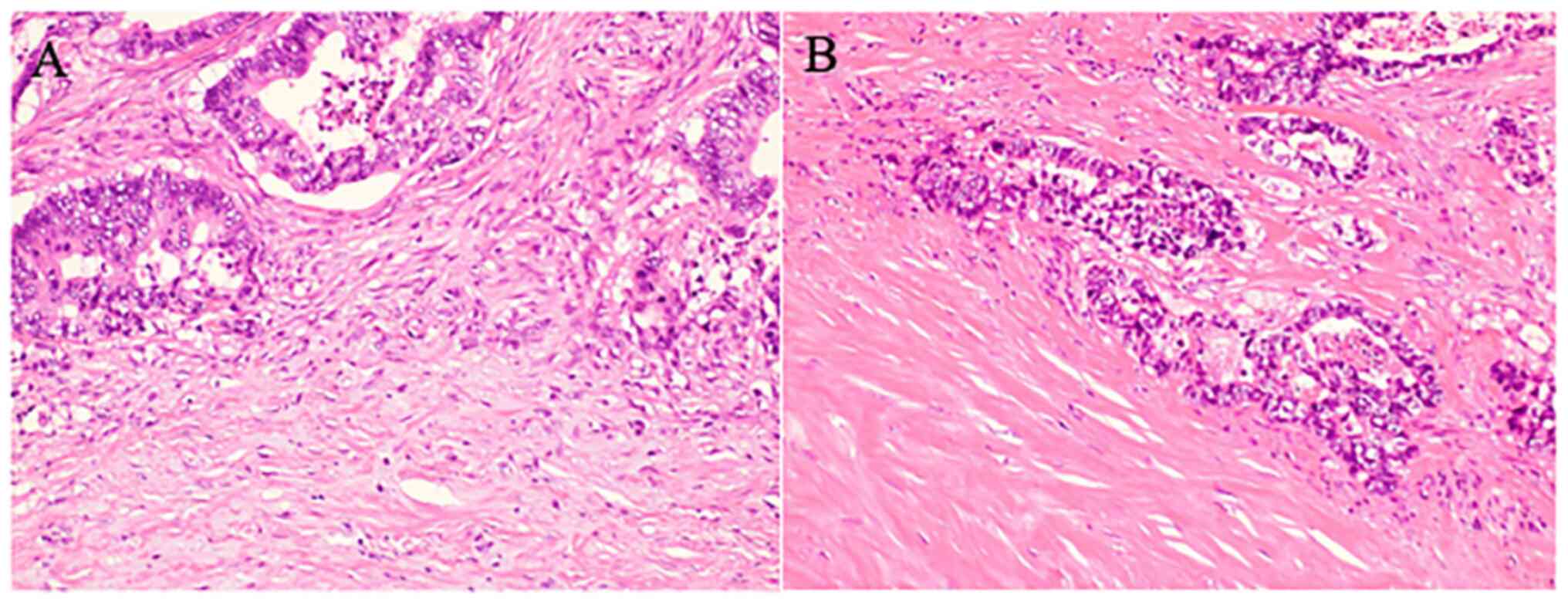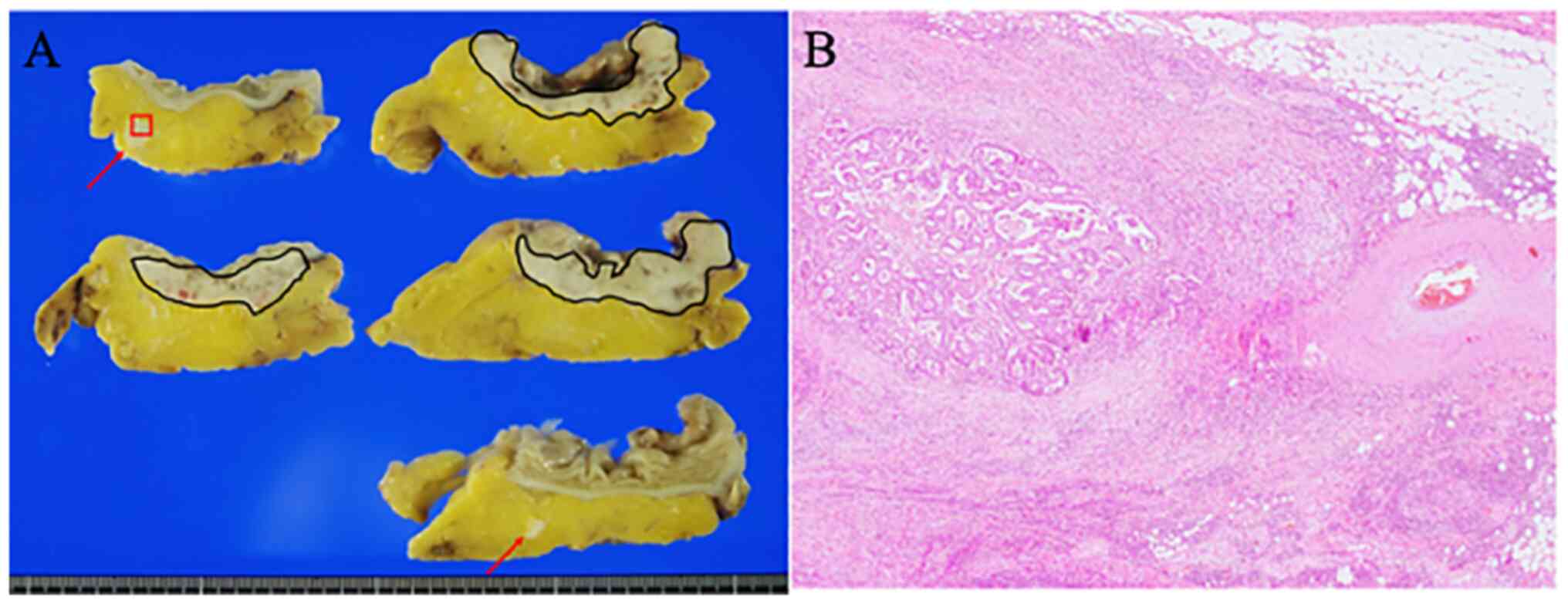|
1
|
Farc O and Cristea V: An overview of the
tumor microenviroment, from cells to complex networks (Review). Exp
The Med. 21:962021. View Article : Google Scholar : PubMed/NCBI
|
|
2
|
Li J, Chen D and Shen M: Tumor
microenvironment shapes colorectal cancer progression, metastasis,
and treatment responses. Front Med (Lausanne). 9:8690102022.
View Article : Google Scholar : PubMed/NCBI
|
|
3
|
Ueno H, Kajiwara Y, Ajioka Y, Sugai T,
Sekine S, Ishiguro M, Takashima A and Kanemitsu Y:
Histopathological atlas of desmoplastic reaction characterization
in colorectal cancer. Jpn J Clin Oncol. 51:1004–1012. 2021.
View Article : Google Scholar : PubMed/NCBI
|
|
4
|
Ueno H, Ishiguro M, Nakatani E, Ishikawa
T, Uetake H, Murotani K, Matsui S, Teramukai S, Sugai T, Ajioka Y,
et al: Prognostic value of desmoplastic reaction characterisation
in stage II colon cancer: Prospective validation in a Phase 3 study
(SACURA Trial). Br J Cancer. 124:1088–1097. 2021. View Article : Google Scholar : PubMed/NCBI
|
|
5
|
Ueno H, Konishi T, Ishikawa Y, Shimazaki
H, Ueno M, Aosasa S, Saiura A, Shinto E, Kajiwara Y, Mochizuki S,
et al: Primary tumor histology affects oncological outcomes
independently of the anatomical extent of disease in colorectal
liver metastasis. JMA J. 3:240–250. 2020. View Article : Google Scholar : PubMed/NCBI
|
|
6
|
Nearchou IP, Kajiwara Y, Mochizuki S,
Harrison DJ, Caie PD and Ueno H: Novel internationally verified
method reports desmoplastic reaction as the most significant
prognostic feature for disease-specific survival in stage II
colorectal cancer. Am J Surg Pathol. 43:1239–1248. 2019. View Article : Google Scholar : PubMed/NCBI
|
|
7
|
Ueno H, Kanemitsu Y, Sekine S, Ishiguro M,
Ito E, Hashiguchi Y, Kondo F, Shimazaki H, Kajiwara Y, Okamoto K,
et al: A multicenter study of the prognostic value of desmoplastic
reaction categorization in stage II colorectal cancer. Am J Surg
Pathol. 43:1015–1022. 2019. View Article : Google Scholar : PubMed/NCBI
|
|
8
|
Ueno H, Sekine S, Oshiro T, Kanemitsu Y,
Hamaguchi T, Shida D, Takashima A, Ishiguro M, Ito E, Hashiguchi Y,
et al: Disentangling the prognostic heterogeneity of stage III
colorectal cancer through histologic stromal categorization.
Surgery. 163:777–783. 2018. View Article : Google Scholar : PubMed/NCBI
|
|
9
|
Ueno H, Kanemitsu Y, Sekine S, Ishiguro M,
Ito E, Hashiguchi Y, Kondo F, Shimazaki H, Mochizuki S, Kajiwara Y,
et al: Desmoplastic pattern at the tumor front defines
poor-prognosis subtypes of colorectal cancer. Am J Surg Pathol.
41:1506–1512. 2017. View Article : Google Scholar : PubMed/NCBI
|
|
10
|
Ueno H, Shinto E, Shimazaki H, Kajiwara Y,
Sueyama T, Yamamoto J and Hase K: Histologic categorization of
desmoplastic reaction: Its relevance to the colorectal cancer
microenvironment and prognosis. Ann Surg Oncol. 22:1504–1512. 2015.
View Article : Google Scholar : PubMed/NCBI
|
|
11
|
Studer L, Blank A, Bokhorst JM, Nagtegaal
ID, Zlobec I, Lugli A, Fischer A and Dawson H: Taking tumour
budding to the next frontier - a post International tumour budding
consensus conference (ITBCC) 2016 review. Histopathology.
78:476–484. 2021. View Article : Google Scholar : PubMed/NCBI
|
|
12
|
Nagtegaal ID, Knijn N, Hugen N, Marshall
HC, Sugihara K, Tot T, Ueno H and Quirke P: Tumor deposits in
colorectal cancer: Improving the value of modern staging-a
systematic review and meta-analysis. J Clin Oncol. 35:1119–1127.
2017. View Article : Google Scholar : PubMed/NCBI
|
|
13
|
Ueno H, Jones AM, Wilkinson KH, Jass JR
and Talbot IC: Histological categorisation of fibrotic cancer
stroma in advanced rectal cancer. Gut. 53:581–586. 2004. View Article : Google Scholar : PubMed/NCBI
|
|
14
|
Ueno H, Jones A, Jass JR and Talbot IC:
Clinicopathological significance of the ‘keloid-like’ collagen and
myxoid stroma in advanced rectal cancer. Histopathology.
40:327–334. 2002. View Article : Google Scholar : PubMed/NCBI
|
|
15
|
Ueno H, Mochizuki H, Shirouzu K, Kusumi T,
Yamada K, Ikegami M, Kawachi H, Kameoka S, Ohkura Y, Masaki T, et
al: Multicenter study for optimal categorization of extramural
tumor deposits for colorectal cancer staging. Ann Surg.
255:739–746. 2012. View Article : Google Scholar : PubMed/NCBI
|
|
16
|
Lugli A, Kirsch R, Ajioka Y, Bosman F,
Cathomas G, Dawson H, El Zimaity H, Fléjou JF, Hansen TP, Hartmann
A, et al: Recommendations for reporting tumor budding in colorectal
cancer based on the International tumor budding consensus
conference (ITBCC) 2016. Mod Pathol. 30:1299–1311. 2017. View Article : Google Scholar : PubMed/NCBI
|
|
17
|
Goldstein NS and Turner JR: Pericolonic
tumor deposits in patients with T3N+MO colon adenocarcinomas:
Markers of reduced disease free survival and intra-abdominal
metastases and their implications for TNM classification. Cancer.
88:2228–2238. 2000. View Article : Google Scholar : PubMed/NCBI
|
|
18
|
Lugli A, Zlobec I, Berger MD, Kirsch R and
Nagtegaal ID: Tumour budding in solid cancers. Nat Rev Clin Oncol.
18:101–115. 2021. View Article : Google Scholar : PubMed/NCBI
|
|
19
|
Li ZW, He L, Zheng Z, Zhang Q, Xu YT, Chen
JY, Shi J, Huang WB and Fan XS: Combined assessment of tumour cell
nest size and desmoplastic reaction as an excellent prognostic
predictor in oesophageal squamous cell carcinoma. Histopathology.
80:1112–1120. 2022. View Article : Google Scholar : PubMed/NCBI
|
|
20
|
Sakaguchi T, Satoi S, Hashimoto D,
Yamamoto T, Yamaki S, Hirooka S, Ishida M, Ikeura T, Inoue K,
Naganuma M, et al: High tumor budding predicts a poor prognosis in
resected duodenal adenocarcinoma. Surg Today. 52:931–940. 2022.
View Article : Google Scholar : PubMed/NCBI
|
|
21
|
Noda Y, Ishida M, Ueno Y, Fujisawa T, Iwai
H and Tsuta K: Novel pathological predictive factors for extranodal
extension in oral squamous cell carcinoma: A retrospective cohort
study based on tumor budding, desmoplastic reaction,
tumor-infiltrating lymphocytes, and depth of invasion. BMC Cancer.
22:4022022. View Article : Google Scholar : PubMed/NCBI
|
|
22
|
Kosaka H, Ishida M, Ueno M, Komeda K,
Hokutou D, Iida H, Hirokawa F, Matsui K, Sekimoto M and Kaibori M:
Tumor budding may be a promising prognostic indicator in
intrahepatic cholangiocarcinoma: A multicenter retrospective study.
Ann Gastroenterol Surg. 2022.(In press). View Article : Google Scholar
|
|
23
|
Sueyama T, Kajiwara Y, Mochizuki S,
Shimazaki H, Shinto E, Hase K and Ueno H: Periostin as a key
molecule defining desmoplastic environment in colorectal cancer.
Virchows Arch. 478:865–874. 2021. View Article : Google Scholar : PubMed/NCBI
|
















